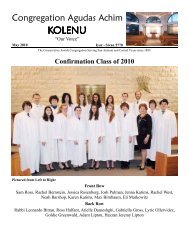LESSONS - Congregation Agudas Achim
LESSONS - Congregation Agudas Achim
LESSONS - Congregation Agudas Achim
Create successful ePaper yourself
Turn your PDF publications into a flip-book with our unique Google optimized e-Paper software.
12<br />
CONGREGATION<br />
AGUDAS<br />
ACHIM<br />
Your Jewish Home<br />
As this issue of Kolenu goes to press,<br />
we are winding down our Kol Nidre<br />
Appeal, preparing next year’s budget<br />
for presentation to the board, tending<br />
to a number of facility issues and<br />
looking forward to an exciting new year<br />
of services, as well as educational,<br />
cultural and recreational programs and<br />
activities. Kol Nidre, by any account, has<br />
been a hudge success, and I would like to thank everyone<br />
for participating in this campaign. We raised over $40,000<br />
which will be used for Jewish education and for subsidizing<br />
memberships of those in need of assistance. Our members’<br />
generous contributions show that when the synagogue calls<br />
upon you to support its endeavors you certainly respond.<br />
Thank you for your generosity.<br />
January, of course, is a month for making resolutions.<br />
As I was making my own list, which consisted mainly of<br />
resolutions to eat less and exercise more, I turned to Antoine<br />
de Saint Exupery’s “The Little Prince” for further inspiration.<br />
Exupery’s “Little Prince” lived alone on a tiny planet, which<br />
had three volcanoes, several baobabs (giant weeds?) and<br />
caterpillars, and a flower - a rose. He believed that his rose<br />
grew only on his planet and was, therefore, unique in all<br />
the universe. Because he was attracted to its great beauty<br />
and uniqueness the prince loved his rose. He built a fence<br />
around it to protect it from the caterpillars, and he watered it<br />
faithfully. Since the fence would not protect the rose against<br />
baobabs, which if neglected would overrun everything on<br />
the planet, the prince would pull them up at the very first<br />
moment he could distinguish them from rosebuds. And the<br />
rose flourished and the prince took great pride in it.<br />
During his interplanetary travels, the prince became<br />
understandably perturbed and deeply saddened when, on<br />
earth, he discovered a rose garden with five thousand roses,<br />
all beautiful and indistinguishable from his rose. His unique<br />
and special rose now seemed very common. A fox helped<br />
the Little Prince to realize that he loved his rose, not for<br />
its beauty or its singularity, but because he watered it and<br />
because it was his.<br />
Caring for something, as the prince had cared for his rose,<br />
is precisely what makes it unique. The fox, you will recall,<br />
implored the prince to “tame” him, so that each of them<br />
would be distinguishable from others of their kind. “If<br />
you tame me,” said the fox, “it will be as if the sun came<br />
to shine on my life. I shall know the sound of a step that<br />
will be different from all the others. Other steps send me<br />
hurrying back underneath the ground. Yours,will call me,<br />
like music, out of my burrow.” The prince tamed the fox, and<br />
understood, by analogy, that because he had cared for his<br />
rose he had, in effect, tamed it and made it unique. Thus he<br />
was able to confront the thousands of roses in the garden<br />
and say to them: “You are beautiful but you are empty.” “To<br />
be sure,” the prince continued,<br />
“ . . . an ordinary passerby would think that my rose looked<br />
just like you . . . But in herself alone she is more important<br />
than all the hundreds of you other roses: because it is she<br />
that I have watered; because it is she that I have put under<br />
the glass globe; because it is she that I have sheltered<br />
behind the screen; because it is for her that I have killed<br />
the caterpillars (except the two or three that we saved to<br />
become butterflies); because it is she that I have listened to,<br />
when she grumbled, or boasted, or even sometimes when<br />
she said nothing. Because she is my rose.”<br />
I believe there is an analogue in this story for synagogues.<br />
Our love for our synagogue, just like the little prince’s love<br />
for his rose, is defined by our caring for it, protecting it, and<br />
making it ours. Thus we ought to ask and find answers to<br />
such questions as: “How do we best water a synagogue?”<br />
“How do we put her under a glass globe, or shelter<br />
her behind a screen?” “How do we best make her our<br />
synagogue, and cause the sun to shine upon her as she calls<br />
to us like music?” Our individual and collective answers to<br />
these questions, I would like to suggest, can be the basis of<br />
our resolutions relating to our synagogue.<br />
Have a Happy New Year!<br />
Allan H. Glazerman<br />
Executive Director<br />
Scholarships Available<br />
Students wishing to go on a recognized program to Israel,<br />
including March of the Living and Birthright, or wishing<br />
to attend Jewish camps, are encouraged to apply directly<br />
to the synagogue for partial scholarships. To request an<br />
application please call Karen Katims at the synagogue and<br />
request a Scholarship Application Form. Applications must<br />
be received in the office at least thirty days before your<br />
chosen Israel or camp program requires a check.





